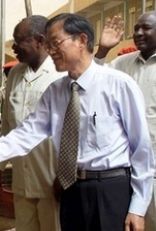China has done its best to solve Darfur crisis – envoy
June 21, 2007 CAIRO) — China’s special envoy on Darfur said Thursday his country would seriously consider sending troops for a peacekeeping mission to the wartorn Sudanese region and insisted Beijing is doing its best to solve the crisis.
 Liu Guijin blasted critics who have accused Beijing of protecting Khartoum from pressure over Darfur because of China’s major oil interests in Sudan. Some activists _ including U.S. actress Mia Farrow _ have branded the 2008 Beijing Olympic games as the “genocide Olympics” to pressure China.
Liu Guijin blasted critics who have accused Beijing of protecting Khartoum from pressure over Darfur because of China’s major oil interests in Sudan. Some activists _ including U.S. actress Mia Farrow _ have branded the 2008 Beijing Olympic games as the “genocide Olympics” to pressure China.
“To link the Chinese corporations’ involvement in the (Sudanese) oil sector with loss of life in Darfur is baseless,” Liu said. “That link is really ridiculous. The Olympics are a non-political event.”
China is massively investing in Africa and is increasingly viewed as a power broker in countries like Sudan, which exports two thirds of its oil output to China. At the U.N., Beijing _ which holds veto powers at the Security Council _ has opposed harsh measures against Sudan over the Darfur violence.
Liu defended Beijing’s efforts over Darfur. “Even the United States has to admit that we’ve played a positive role,” in solving the crisis in Darfur, he said. “We’ve tried our best.”
He said China was instrumental in a diplomatic breakthrough earlier this month when Khartoum finally agreed to let a strong force of U.N. and African Union peacekeepers deploy in Darfur.
Sudan has accepted this hybrid operation “without any reservation,” said Liu, adding that Beijing had advised Khartoum to “be more flexible” regarding the force.
The joint mission is now due to deploy in coming months in an attempt to end fighting that killed over 200,000 people and made 2.5 million refugees in Darfur since 2003, when local rebels took arms against the central Sudanese government.
China has not received a formal request to send soldiers for the 19,000-strong peacekeeping mission, but is “open and sincere to making its contribution,” the special envoy said.
“We will study the request, carefully and seriously,” he said, stating it was “a strong sign” that China had already committed to contribute 275 engineering troops to the U.N.’s current build-up in Darfur.
However, “any kind of peacekeeping mission will be useless” if it does not have the support of the Sudanese government, the envoy said. He warned that pushing for more sanctions against Khartoum now that it has agreed to allow peacekeepers “could be counterproductive.”
China dramatically increased its role in trying to resolve the Darfur crisis after criticism against it mounted and threatened to taint the Olympic Games, a sensitive point for Beijing.
Liu pointed out that India and Malaysia have strongly invested in Sudan’s oil industry, and that a French firm also has a drilling concession, without any of these countries being criticized. “Maybe some forces are not happy with China’s presence” in Sudan, Liu said.
China also is a major weapons supplier to Khartoum, though Beijing says the sales do not breach the U.N. embargo on weapons entering Darfur. But rights activists say this is disingenuous because the army can then freely bring the gear into the region.
An AP reporter recently saw fighter jets sold by China operating in Darfur, where Russian-made cargo planes have also been regularly used by government forces to bomb villages in recent months.
The next key step to bring peace to Darfur will be renewed negotiations between splinter rebel groups and Khartoum, Lui said. While one faction signed a peace deal last year, most continue to fight, and the current African Union force in the region has been unable to stop the violence.
Liu said he hoped the new round of negotiations would begin “some time in August,” possibly in Juba, South Sudan’s semiautonomous capital, and called for Western pressure on rebel leaders to join a peace deal.
(AP)
